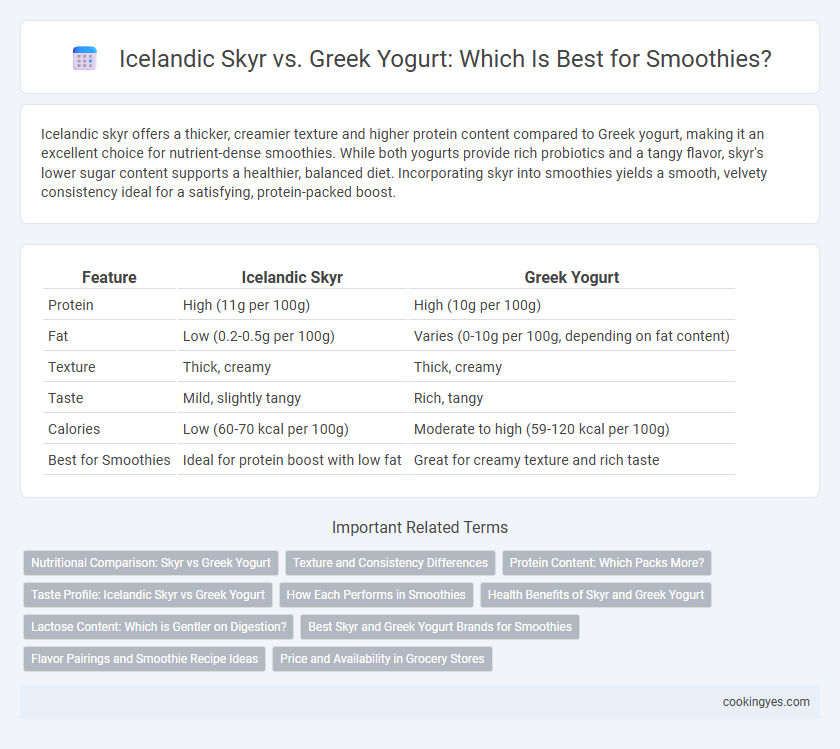Icelandic skyr offers a thicker, creamier texture and higher protein content compared to Greek yogurt, making it an excellent choice for nutrient-dense smoothies. While both yogurts provide rich probiotics and a tangy flavor, skyr's lower sugar content supports a healthier, balanced diet. Incorporating skyr into smoothies yields a smooth, velvety consistency ideal for a satisfying, protein-packed boost.
Table of Comparison
| Feature | Icelandic Skyr | Greek Yogurt |
|---|---|---|
| Protein | High (11g per 100g) | High (10g per 100g) |
| Fat | Low (0.2-0.5g per 100g) | Varies (0-10g per 100g, depending on fat content) |
| Texture | Thick, creamy | Thick, creamy |
| Taste | Mild, slightly tangy | Rich, tangy |
| Calories | Low (60-70 kcal per 100g) | Moderate to high (59-120 kcal per 100g) |
| Best for Smoothies | Ideal for protein boost with low fat | Great for creamy texture and rich taste |
Nutritional Comparison: Skyr vs Greek Yogurt
Icelandic skyr offers higher protein content, typically around 11 grams per 100 grams, compared to Greek yogurt's 9 grams, making it an excellent choice for muscle recovery and satiety in smoothies. Skyr is lower in fat, often less than 0.5%, whereas Greek yogurt ranges from 2% to 10% fat, depending on the variety, which affects the smoothie's creaminess and caloric density. Both yogurts provide probiotics and similar calcium levels, supporting digestive health and bone strength in a balanced diet.
Texture and Consistency Differences
Icelandic skyr features a thicker, creamier texture with a denser consistency compared to Greek yogurt, making it ideal for smoothies that require a rich, velvety base. Skyr's higher protein content contributes to its firmness, providing a smooth yet substantial mouthfeel that holds up well when blended with fruits and liquids. Greek yogurt is creamier but slightly less dense, offering a lighter texture that blends into a smoother, less heavy smoothie experience.
Protein Content: Which Packs More?
Icelandic skyr contains approximately 11 grams of protein per 100 grams, making it richer in protein compared to Greek yogurt, which typically has about 9 grams per 100 grams. The higher protein content in skyr supports muscle recovery and satiety, making it an ideal choice for protein-packed smoothies. Choosing skyr over Greek yogurt can enhance the nutritional profile of smoothies by providing a more substantial protein boost.
Taste Profile: Icelandic Skyr vs Greek Yogurt
Icelandic skyr offers a milder, less tangy flavor with a creamy, thick texture that blends smoothly in smoothies, enhancing fruit sweetness without overpowering it. Greek yogurt features a richer, more pronounced tang and a denser consistency, adding a bold, slightly sour taste that balances sweet and tart smoothie ingredients. Choosing between the two depends on whether you prefer a subtle, creamy base or a tangier, robust flavor in your smoothie.
How Each Performs in Smoothies
Icelandic skyr offers a thicker, creamier texture with a higher protein content, making smoothies rich and filling while maintaining a smooth consistency. Greek yogurt, with its slightly tangier flavor and moderate thickness, blends easily for a balanced, creamy smoothie that complements fruits and other ingredients. Both types enhance smoothie nutritional value but choosing skyr results in more protein-dense blends, whereas Greek yogurt delivers a classic creamy texture with a subtle tartness.
Health Benefits of Skyr and Greek Yogurt
Icelandic skyr is rich in protein and low in fat, making it an excellent choice for muscle recovery and weight management in smoothies. Greek yogurt also offers high protein content and probiotics that support digestive health and immune function. Both skyr and Greek yogurt provide essential calcium and vitamins, enhancing smoothies with nutrients vital for bone strength and overall wellness.
Lactose Content: Which is Gentler on Digestion?
Icelandic skyr contains lower lactose levels compared to Greek yogurt, making it gentler on digestion, especially for those with lactose sensitivity. Skyr's thick, protein-rich texture blends smoothly in smoothies while promoting better gut tolerance. Greek yogurt, though creamy and rich, tends to have higher lactose, potentially causing discomfort for sensitive individuals.
Best Skyr and Greek Yogurt Brands for Smoothies
When choosing the best skyr and Greek yogurt brands for smoothies, look for Icelandic skyr brands like Siggi's and Icelandic Provisions, known for their thick texture and high protein content, which enhance creaminess and nutrition in blends. Greek yogurt options such as FAGE Total and Chobani offer rich, tangy flavors and smooth consistency that complement fruit and vegetable smoothies perfectly. Prioritizing brands with minimal added sugars and live probiotics ensures health benefits and a superior taste experience in every smoothie.
Flavor Pairings and Smoothie Recipe Ideas
Icelandic skyr offers a thicker and milder flavor that pairs well with berries like blueberries and raspberries, enhancing the natural sweetness of smoothies. Greek yogurt, known for its creamy texture and tangy taste, complements tropical fruits such as mango and pineapple, creating a balanced and refreshing smoothie blend. Combining skyr with spinach and banana results in a nutrient-rich green smoothie, while Greek yogurt mixed with honey and strawberries makes a classic, protein-packed treat.
Price and Availability in Grocery Stores
Icelandic skyr generally tends to be more expensive than Greek yogurt due to its specialty production and limited availability in grocery stores, especially outside of Northern Europe. Greek yogurt is widely stocked and offered at competitive prices across most supermarkets in the U.S. and Europe, making it a more budget-friendly option for smoothies. The broader distribution and familiarity of Greek yogurt contribute to its easier accessibility compared to the niche market presence of skyr.
Icelandic skyr vs Greek yogurt for smoothies Infographic

 cookingyes.com
cookingyes.com